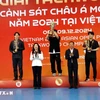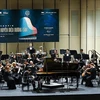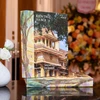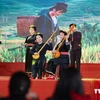A performance featuring xam, the music of blind street performers, along with contemporary music genres, took place at the Hanoi Opera House on January 20.
Entitled Xam and Life, the show aimed to revive xam, a type of Hanoi street singing from the old days. It told stories of the life of the xam – its ups and downs, and how xam reflect on their lives, according to musician Nguyen Quang Long.
"I and other artists of the Xam Ha Thanh Group always thought about promoting this type of singing to the public, to save it from being erased from our culture," Long said. "After many years working with tenacious effort, we have revived some xam songs and created some new tunes to share."
During the first part of the concert, the artists presented classic xam songs that had been popular in northern Vietnam in the early 20th century, said Hoang Chuong, Director of the Centre for Research, Preservation and Promotion of Vietnamese Traditional Culture. Chuong is also general director of the performance programme.
For nearly a century, starting in 1900, tau dien (tram) roamed the streets of Hanoi filled with live entertainment. Xam tau dien singers – mostly travelling, blind artists accompanied by dan nhi (two-string violins) or dan bau (monochords) – would charm commuters on a daily basis.
Apart from xam tau dien, the wandering artists also produced xam cho (market performances). They sang humorous songs that advertised products they were selling, such as toothpicks, balm and herbal medicines.
Through the songs' content and their choreography, xam artists told stories about their tragic lives, or the misery of the poor, and evoked sympathy from their audience.
When the streetcar lines were abandoned in the late 1980s, this type of street singing fell into obscurity.
In the second part of the show, the artists introduced contemporary xam-inspired songs, composed based on old rhythms used on the street.
"Contemporary xam singing helps enrich the collection of xam songs and make xam more accessible to the audience," Long said. "Xam isn't only a music of the 20th century – it can reflect all of society's problems."
It was a surprise for audience at the final chapter of the show, where the artists daringly combined xam tunes with jazz, hip-hop and beatbox.
Ending the programme, the organiser awarded scholarships to some young artists who have shown passion for learning about, preserving and promoting xam singing.-VNA
Entitled Xam and Life, the show aimed to revive xam, a type of Hanoi street singing from the old days. It told stories of the life of the xam – its ups and downs, and how xam reflect on their lives, according to musician Nguyen Quang Long.
"I and other artists of the Xam Ha Thanh Group always thought about promoting this type of singing to the public, to save it from being erased from our culture," Long said. "After many years working with tenacious effort, we have revived some xam songs and created some new tunes to share."
During the first part of the concert, the artists presented classic xam songs that had been popular in northern Vietnam in the early 20th century, said Hoang Chuong, Director of the Centre for Research, Preservation and Promotion of Vietnamese Traditional Culture. Chuong is also general director of the performance programme.
For nearly a century, starting in 1900, tau dien (tram) roamed the streets of Hanoi filled with live entertainment. Xam tau dien singers – mostly travelling, blind artists accompanied by dan nhi (two-string violins) or dan bau (monochords) – would charm commuters on a daily basis.
Apart from xam tau dien, the wandering artists also produced xam cho (market performances). They sang humorous songs that advertised products they were selling, such as toothpicks, balm and herbal medicines.
Through the songs' content and their choreography, xam artists told stories about their tragic lives, or the misery of the poor, and evoked sympathy from their audience.
When the streetcar lines were abandoned in the late 1980s, this type of street singing fell into obscurity.
In the second part of the show, the artists introduced contemporary xam-inspired songs, composed based on old rhythms used on the street.
"Contemporary xam singing helps enrich the collection of xam songs and make xam more accessible to the audience," Long said. "Xam isn't only a music of the 20th century – it can reflect all of society's problems."
It was a surprise for audience at the final chapter of the show, where the artists daringly combined xam tunes with jazz, hip-hop and beatbox.
Ending the programme, the organiser awarded scholarships to some young artists who have shown passion for learning about, preserving and promoting xam singing.-VNA



















